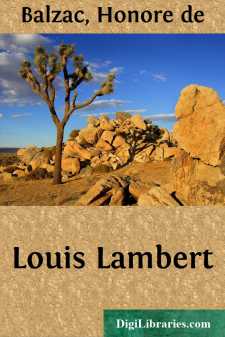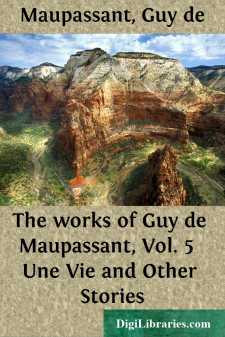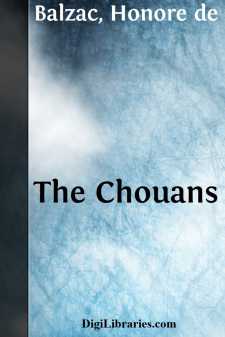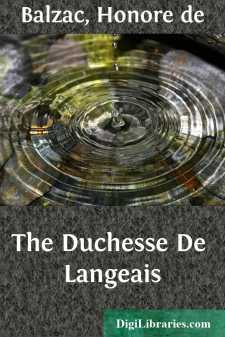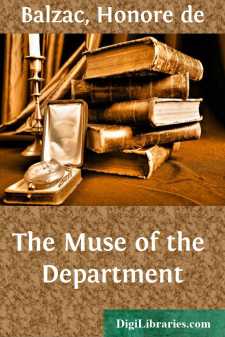Literary Collections
- American 84
- Ancient, Classical & Medieval 14
- Asian 1
- Australian & Oceanian 1
- Canadian 55
- Continental European
- English, Irish, Scottish, Welsh 179
- Essays 160
- General 24
- Letters 46
- Middle Eastern 1
Continental European Books
Sort by:
by:
Honore de Balzac
LOUIS LAMBERT Louis Lambert was born at Montoire, a little town in the Vendomois, where his father owned a tannery of no great magnitude, and intended that his son should succeed him; but his precocious bent for study modified the paternal decision. For, indeed, the tanner and his wife adored Louis, their only child, and never contradicted him in anything. At the age of five Louis had begun by reading...
more...
by:
Honore de Balzac
CHAPTER I. SERAPHITUS As the eye glances over a map of the coasts of Norway, can the imagination fail to marvel at their fantastic indentations and serrated edges, like a granite lace, against which the surges of the North Sea roar incessantly? Who has not dreamed of the majestic sights to be seen on those beachless shores, of that multitude of creeks and inlets and little bays, no two of them alike,...
more...
by:
Jeremiah Curtin
Introduction Eliza Orzeszko, the authoress of "The Argonauts," is the greatest female writer and thinker in the Slav world at present. There are keen and good critics, just judges of thought and style, who pronounce her the first literary artist among the women of Europe. These critics are not Western Europeans, for Western Europe has no means yet of appreciating this gifted woman. No doubt it...
more...
The most robust and masculine of recent French novelists is a typical Norman, sprung from an ancient noble family, originally of Lorraine, but long settled in the Pays de Caux. The traveler from England towards Paris, soon after leaving Dieppe, sees on his left hand, immediately beyond the station of St. Aubin, a handsome sixteenth-century house, the Château de Miromesnil, on a hill above the railway....
more...
by:
Honore de Balzac
THE DESERTED WOMAN In the early spring of 1822, the Paris doctors sent to Lower Normandy a young man just recovering from an inflammatory complaint, brought on by overstudy, or perhaps by excess of some other kind. His convalescence demanded complete rest, a light diet, bracing air, and freedom from excitement of every kind, and the fat lands of Bessin seemed to offer all these conditions of recovery....
more...
by:
Honore de Balzac
I. AN AMBUSCADE Early in the year VIII., at the beginning of Vendemiaire, or, to conform to our own calendar, towards the close of September, 1799, a hundred or so of peasants and a large number of citizens, who had left Fougeres in the morning on their way to Mayenne, were going up the little mountain of La Pelerine, half-way between Fougeres and Ernee, a small town where travellers along that road...
more...
by:
Honore de Balzac
THE DUCHESSE OF LANGEAIS In a Spanish city on an island in the Mediterranean, there stands a convent of the Order of Barefoot Carmelites, where the rule instituted by St. Theresa is still preserved with all the first rigor of the reformation brought about by that illustrious woman. Extraordinary as this may seem, it is none the less true. Almost every religious house in the Peninsula, or in Europe for...
more...
by:
Honore de Balzac
A MAN OF BUSINESS The word lorette is a euphemism invented to describe the status of a personage, or a personage of a status, of which it is awkward to speak; the French Academie, in its modesty, having omitted to supply a definition out of regard for the age of its forty members. Whenever a new word comes to supply the place of an unwieldy circumlocution, its fortune is assured; the word lorette has...
more...
by:
Honore de Balzac
COLONEL CHABERT "HULLO! There is that old Box-coat again!" This exclamation was made by a lawyer's clerk of the class called in French offices a gutter-jumper—a messenger in fact—who at this moment was eating a piece of dry bread with a hearty appetite. He pulled off a morsel of crumb to make into a bullet, and fired it gleefully through the open pane of the window against which he was...
more...
by:
Honore de Balzac
THE MUSE OF THE DEPARTMENT On the skirts of Le Berry stands a town which, watered by the Loire, infallibly attracts the traveler's eye. Sancerre crowns the topmost height of a chain of hills, the last of the range that gives variety to the Nivernais. The Loire floods the flats at the foot of these slopes, leaving a yellow alluvium that is extremely fertile, excepting in those places where it has...
more...


